|
|
|
Sort Order |
|
|
|
Items / Page
|
|
|
|
|
|
|
| Srl | Item |
| 1 |
ID:
131624
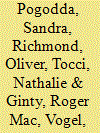

|
|
|
|
|
| Publication |
2014.
|
| Summary/Abstract |
European Union (EU) interventions in conflict countries tend to focus on governance reforms of political and economic frameworks instead of the geopolitical context or the underlying power asymmetries that fuel conflict. They follow a liberal pattern often associated with northern donors and the UN system more generally. The EU's approach diverges from prevalent governance paradigms mainly in its engagement with social, identity and socio-economic exclusion. This article examines the EU's 'peace-as-governance' model in Cyprus, Georgia, Palestine and Bosnia and Herzegovina. These cases indicate that a tense and contradictory strategic situation may arise from an insufficient redress of underlying conflict issues.
|
|
|
|
|
|
|
|
|
|
|
|
|
|
|
|
| 2 |
ID:
096039
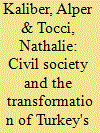

|
|
|
|
|
| Publication |
2010.
|
| Summary/Abstract |
This article explores the multilayered characteristics of civil society involvement in Turkey's Kurdish question. It examines the role and impact of Turkish and Kurdish civil society organizations (CSOs) in the conflict in terms of securitizing, holding and desecuritizing activities. It presents a comprehensive analysis of the identities, strategies and actions of these CSOs, as well as of the political opportunity structure in which they operate, including time-contingent factors, the domestic institutional and sociopolitical environment, and the involvement of external actors such as the EU. Despite increasing civil society involvement, Turkey's Kurdish question is still strongly shaped by the nature of the Turkish state and the manner in which it has responded to the Kurdish nationalist challenge. Whereas the specificities of the Turkish state have moulded the Kurdish nationalist challenge, the latter - and particularly the actions of the Kurdistan Workers' Party (PKK) - have further fuelled the securitizing discourse of the Turkish state establishment, fundamentally shaping and constraining the environment in which civil society operates.
|
|
|
|
|
|
|
|
|
|
|
|
|
|
|
|
| 3 |
ID:
088907
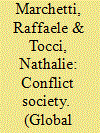

|
|
|
|
|
| Publication |
2009.
|
| Summary/Abstract |
This article analyses the relationship between civil society and conflict. It aims to provide an analytical framework to unpack this complex relationship and assess the impacts which civil society may have on conflict. In a first section, it analyses the implications of context on civil society, namely the implications that statehood, democracy, nationalism, development and international presence have on the nature of civil society. In the second section it examines more specifically the role of civil society in ethno-political conflicts, or as we rename it 'conflict society'. The final section turns to the identification of different factors determining the impact of civil society on conflicts, including political identities, frameworks of action and political opportunity structures in which civil society actors operate. Accordingly, the different combinations of these determinants lead to the formation of civil society actors and ensuing actions that can either fuel conflict, sustain the status quo, or build peace
|
|
|
|
|
|
|
|
|
|
|
|
|
|
|
|
| 4 |
ID:
061612


|
|
|
|
|
| Publication |
Jan-Mar 2005.
|
|
|
|
|
|
|
|
|
|
|
|
|
|
|
|
| 5 |
ID:
078310


|
|
|
|
|
| Publication |
London, Routledge, 2007.
|
| Description |
xiv, 202p.
|
| Standard Number |
041541394X
|
|
|
|
|
|
|
|
|
|
|
|
Copies: C:1/I:0,R:0,Q:0
Circulation
| Accession# | Call# | Current Location | Status | Policy | Location |
| 052493 | 327.172094/TOC 052493 | Main | On Shelf | General | |
|
|
|
|
| 6 |
ID:
075249


|
|
|
|
|
| Publication |
2006.
|
| Summary/Abstract |
Nathalie Tocci analyses another "frozen conflict" hub in the former Soviet space, namely Georgia's conflicts with Abkhazia and South Ossetia, focussing on the EU's impact on these two conflicts. As in the case of Transnistria, Georgia's conflicts have been afflicted by a paradoxical mix of international neglect, and competing mediation by Russia, the US and international organisations. The EU plays a minimal role in the South Caucasus, and as such it could not have fundamentally influenced conflict resolution in the region. Yet despite its loose contractual ties with Georgia and its modest levels of aid to the region, the EU's peacemaking potential has not been fully met. Beyond an insufficient degree of involvement, the EU has self-constrained its actions due to its insufficient interest in the region on the one hand, and its deference to Russia on the other.
|
|
|
|
|
|
|
|
|
|
|
|
|
|
|
|
| 7 |
ID:
083716


|
|
|
|
|
| Publication |
2008.
|
| Summary/Abstract |
Since the late 1980s, research on political Islam has been much in vogue in Europe and the US. This phenomenon is typically viewed as an expression of religion rather than of politics. Precisely because of the assumed "religious" underpinnings of political Islam, most Western attempts to engage with Islamists often remain trapped in an attempt to test their "democratic credentials". By focussing on what Islamists think about democracy, many studies have ignored the political, social and economic contexts in which Islamists operate. Accounting for the political underpinning of Islamist movements can both help understand their political evolution and open up fruitful avenues for comparative analysis. For this reason, attention is turned to Europe to seek best practices of external engagement with domestic opposition movements in authoritarian contexts, such as Western engagement with opposition actors in Franco's Spain, Kuchma's Ukraine and Shevardnadze's Georgia.
|
|
|
|
|
|
|
|
|
|
|
|
|
|
|
|
| 8 |
ID:
147913
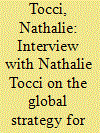

|
|
|
|
|
| Summary/Abstract |
The Global Strategy for the European Union’s Foreign And Security Policy, “Shared Vision, Common Action: A Stronger Europe”, presented at the European Council on 24 June 2016 by Federica Mogherini, High Representative of the European Union for Foreign Affairs and Security Policy and Vice President of the Commission, was drafted by Nathalie Tocci, Deputy Director of the Istituto Affari Internazionali (IAI) and co-editor of The International Spectator.
|
|
|
|
|
|
|
|
|
|
|
|
|
|
|
|
| 9 |
ID:
117860


|
|
|
|
|
| Publication |
2012.
|
| Summary/Abstract |
Turkey is of paramount importance to the United States and to the European Union. The United States is not only the first and foremost partner of both the EU and Turkey. It is also amongst the most committed supporters of Turkey's European integration. In support of Turkey's EU membership bid, Washington has set forth a variety of arguments and has attempted to influence EU decisions at different points in time. US advocacy throughout the 1990s was key to kick-starting Turkey's accession process. By contrast, US influence on Turkey's EU accession decreased visibly in the twenty-first century. The style of US advocacy goes some way towards explaining why this has been the case. When American advocacy has prioritized quiet, behind-closed-doors diplomacy it has tended to be more effective. When instead US officials have relied on loud public diplomacy, European reactions have been generally negative. More importantly however, it is the content of American arguments that has affected their relative impact on European perceptions of Turkey. Depending on whether the US has spoken to the rights-, the interest- or the identity-based logic of enlargement, the influence of the United States on Turkey's EU membership prospects has varied. On the grounds of this analysis, this article concludes by outlining broad policy suggestions regarding how the United States could contribute more effectively to Turkey's European integration.
|
|
|
|
|
|
|
|
|
|
|
|
|
|
|
|
| 10 |
ID:
148305
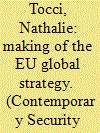

|
|
|
|
|
| Summary/Abstract |
This article traces the evolution of the EU strategic reflection which culminated in the publication of the EU Global Strategy (EUGS) in June 2016. It explains the choices made by EU High Representative Federica Mogherini over this time period—including both the initial strategic assessment and the final EUGS. It provides a behind the scenes view on the players, the organization and the methods of work used to produce a strategic vision for the EU’s role in the world.
|
|
|
|
|
|
|
|
|
|
|
|
|
|
|
|
| 11 |
ID:
084664


|
|
|
| 12 |
ID:
118257


|
|
|
|
|
| Publication |
2013.
|
| Summary/Abstract |
In 2002, what became known as the Middle East Quartet came into being. A decade later, this article explores the performance of the Quartet and the EU's role in it. The conclusions are sobering, pointing to the fact that, while the EU has been the principal driver behind the Quartet, the latter has neither become a genuinely multilateral forum, nor has it been effective in pursuing the goal of a two-state solution in the Middle East.
|
|
|
|
|
|
|
|
|
|
|
|
|
|
|
|
| 13 |
ID:
180063
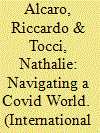

|
|
|
|
|
| Summary/Abstract |
The world on which Covid-19 has unleashed its destructive force is one where the partly supranational and multilateral-minded EU is ill at ease. The pandemic has devastated economies across the world and exacerbated pre-existing dynamics of growing geopolitical rivalry and the declining clout of multilateral regimes and practices. The EU’s response to the Covid shock has been twofold: on the one hand, it has embarked on a new integration effort, with the contours of a ‘transfer union’ emerging for the first time in EU history; on the other hand, it has failed to use the crisis to advance its strategic autonomy agenda. The reason for this dichotomy is that, while the severity of the Covid emergency has shifted public and elite attitudes towards economic solidarity, the lingering commitment to the US has worked as a brake on a similar trend in European foreign policy preferences.
|
|
|
|
|
|
|
|
|
|
|
|
|
|
|
|
| 14 |
ID:
060756


|
|
|
|
|
| Publication |
Jul-Sep 2004.
|
|
|
|
|
|
|
|
|
|
|
|
|
|
|
|
| 15 |
ID:
171156
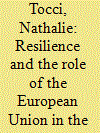

|
|
|
|
|
| Summary/Abstract |
The idea of resilience in EU academia and practice predates the EU Global Strategy. But it is with the 2016 EUGS that resilience was elevated into one of the five guiding principles for the EU’s role in the world. This article recounts the origins of the concept in the context of European foreign policy. Resilience reflected the implicit goal of the EUGS to foster a more joined-up approach to European foreign policy, it epitomized the philosophy of principled pragmatism enshrined in the EUGS, and it captured the transformative approach to complex change advocated by the EU. The implementation of the EUGS over the last three years has been a story of lights and shadows. However, the idea of resilience lives on also and perhaps even more importantly because of its changing interpretation in the European policy debate.
|
|
|
|
|
|
|
|
|
|
|
|
|
|
|
|
| 16 |
ID:
126455
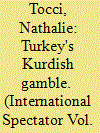

|
|
|
|
|
| Publication |
2013.
|
| Summary/Abstract |
Relations between Turkey and Northern Iraq have evolved at a breathtaking pace, with Turkish policies currently bolstering the KRG's drift towards independence, a prospect considered unthinkable in Ankara only a few years ago. Energy politics is an important component of this puzzle, but Ankara's strategic choice can only be understood against the backdrop of Iraq's deepening sectarianisation, the unfolding civil war in Syria and the dynamics in Turkey's own Kurdish question. The Turkish government is pursuing a high risk/high gain strategy. A more democratic Turkey, in partnership with the KRG, would be best placed to hedge against the centrifugal sectarian trends afflicting its southern neighbours. It is far more likely that Turkey will win its gamble with the support of the European Union.
|
|
|
|
|
|
|
|
|
|
|
|
|
|
|
|
| 17 |
ID:
121179
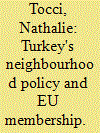

|
|
|
|
|
|
|
|